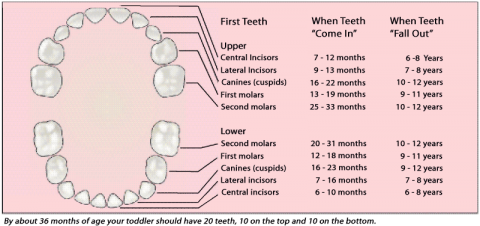Babies usually get their first tooth at around six months. By the time your toddler is 36 months, they should have 20 teeth - 10 on the top and 10 on the bottom.
Overview
Your toddler's first teeth (called baby teeth) are important because they:
- Help your toddler stay healthy. Infections in the mouth and teeth can affect overall health and wellness, now and long into the future
- Help your toddler eat and digest food properly
- Play an important role in speaking
- Help with jaw development and guide the permanent teeth into their proper position
Improve your toddler’s appearance

Visiting the dentist
Be sure to take your toddler to the dentist regularly. The Canadian Dental Association recommends that toddlers see a dentist six months after the first baby tooth appears and no later than 12 months of age.
Dental care for low-income families
If you are on Premium Assistance through the Medical Services Plan (MSP), your toddler may have dental benefits through the Healthy Kids Program.
Teething
Teething lasts about two years. Some toddlers have no problem with it while others become uncomfortable and fussy. A common sign that a new tooth is coming is increased drooling. Teething does not cause fevers.
To help your toddler cope with teething:
- Use a bib to catch drool
- Wipe your toddler’s face often to prevent chaffing
- Give your toddler a clean, chilled wet face cloth or teething ring to chew on. Check the condition of teething rings frequently. Throw away any that are cracked or worn. Teething gels and ointment are not recommended
- Avoid giving teething cookies or biscuits. These can lead to tooth decay
- Give your toddler extra love and patience throughout the teething process